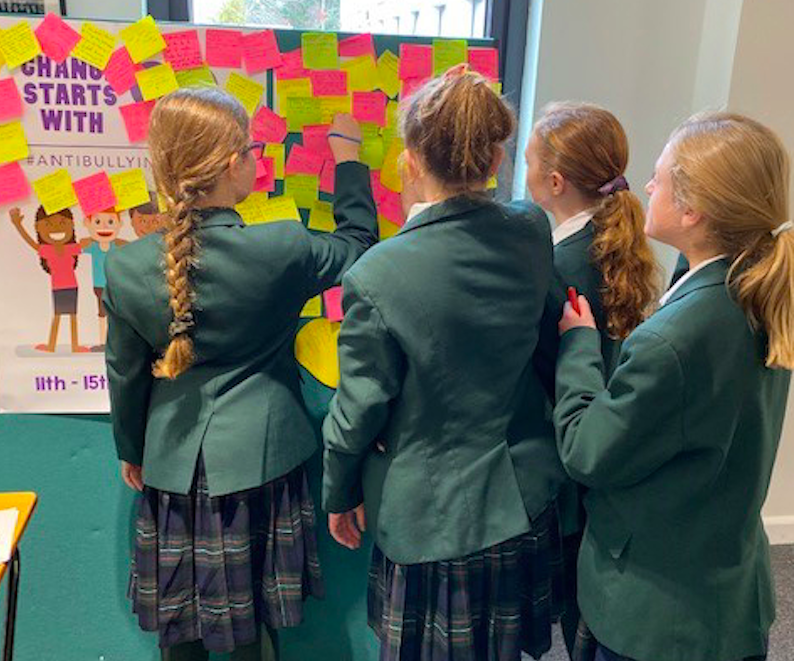


During anti-bullying week the Principal of the Ladies College, Daniele Harford-Fox comments on why banter can be such a trap for young people and lead, unintentionally, to some groups and individuals being marginalised.
"Gloves off. I hate banter.
Let me start by saying, there is a degree to which I understand it. I understand that banter is meant as a joke. I realise that in some ways it makes a young person feel part of a team, of a group. I have even used it myself years ago to connect to some of my pupils. On the surface it is a group of friends laughing together, bonding over each other's foibles. On the surface it’s all play and connection and inclusion.
So, what has led me during this anti-bullying week, to say that banter is at the heart of a cultural problem that not only isolates and disempowers individuals but also excludes and polices certain groups?

Pictured: Danielle Harford Fox is Principal of the Ladies College.
Well, the first problem is that there is no ‘tap out’. There is no way for a student who is being mocked for their height or weight, for their level of intelligence or ability at sport, for being too feminine, too soft, too gentle, to do anything but laugh or perhaps ‘dish it back’.
Instead, they are left to endure years of having their insecurities being constantly poked until, as often happens with 15-year-olds who are figuring out who they are, they break. Maybe they hit someone, maybe they withdraw and isolate themselves, but essentially the dance they were in, pushed them to that point.
But even if that doesn’t happen, even if nobody gets to breaking point, I will argue that the whole thing lacks bravery.
I recognise that for many of the students I’ve taught, banter is often about connection. But my challenge is, why can’t we do that by celebrating what is great in someone rather than mocking their weaknesses. Why can’t we show affection by talking about how loyal or kind, or creative, or brave a friend is rather than by talking about their appearance or how intelligent they are?

Pictured: Cyber bullying has grown alongside the technological advances in recent years.
And I think the answer is because to do so would leave us vulnerable. To tell someone what makes them extraordinary, to tell them why they add value to your life, opens you up and leaves you vulnerable to being mocked yourself. Banter lacks bravery. It is driven by the fear that celebrating others leaves you open to not being supported yourself.
But I also think banter culture creates even more concerning dynamics.
I would argue that banter is territorial. It is often accompanied by that loud mocking voice, by cheers and noise. It is a marker. It lets everyone in the room know who are the people that control that space. I’ve seen environments in the past where wonderful and thoughtful individuals would enter a student common room as part of a sports team, and bray and mock and dominate the space, making other pupils feel uncomfortable and excluded. I’ve had ex-students of colour talk about how uncomfortable they were with that dynamic, I’ve had LGBTQ+ students talk about how intimidating it feels, and I’ve watched girls be at best, side-lined and at worst, objectified in that culture. Banter is the language and dynamics used to show who is in the ‘in-group’ and who is not.
And it keeps everyone in their place. It reminds individuals that you shouldn’t try to ‘get above yourself’. It reminds the too feminine student to ‘man up’, the quiet introverted student to ‘cheer up’. It reminds women that they shouldn’t challenge or question. It reminds pupils of colour that they shouldn’t assume that they are white. It polices, through jokes and ‘bants’, the social hierarchy and if or when you challenge it you are told you have no sense of humour. It is a poking and policing beast hiding behind a smokescreen of apparent good cheer and humour.
I hate it.

Pictured: An anti bullying event at the Ladies College which Express attended in 2019.
I hate it for my students. I hate it because whilst they can feel that they are being bullied, put in their place, they can’t see clearly the force at work and thus can’t really fight back. I hate it because it creates a culture of one-upmanship. It makes vulnerability more vulnerable. It makes difference less acceptable. And it replaces genuine deep connection with this superficial, highly controlled dance of mocking and jibes.
So, the rule in our school is that anything you say that doesn’t make someone sit taller, feel stronger, become fully themselves, is not ok. We speak to empower. We speak to connect. We leave it all on the field.
And for those who say that this approach takes away joy or laughter, I say it encourages those things. The tone of the laugh changes, it becomes freer. The quality of relationship because calmer and more connected. Having a school or culture where people are brave enough to tell each other what makes them great, makes every member of that community feel safe and grow.
We have it in us to recognise the greatest of those around us. We have it in us to be vulnerable, to be joyful, to be connected. Let us be kind. Let us be brave."
Comments
Comments on this story express the views of the commentator only, not Bailiwick Publishing. We are unable to guarantee the accuracy of any of those comments.